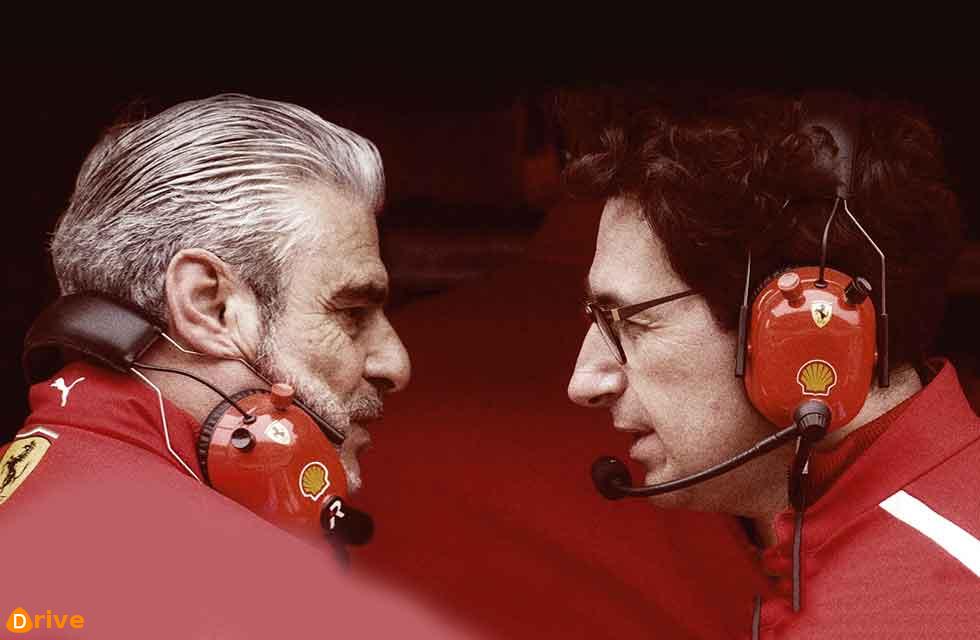As Arrivabene departs, Ferrari gains another new team principal. Will Mattia Binotto succeed where others have failed?
ARRIVEDERCI MAURIZIO!
BY: Maurice Hamilton
The removal of Maurizio Arrivabene (pictured opposite) from the office of team principal at Ferrari was never likely to engender much sympathy from the motorsport media. The announcement earlier this year may have marked the fourth change of leadership in five years but the frequency of such fundamental disorder within the world’s greatest F1 team made less of an editorial theme than Arrivabene’s hand in his own downfall.

The 61-year-old’s tenure in arguably one of the most high-pressure posts in motor racing was marked by an abrupt and, at times, aggressive attitude. Communication with the media was virtually non-existent. It has been suggested Arrivabene was merely acting on the orders of Ferrari president, the late Sergio Marchionne. If so, Arrivabene embraced it with a seasoned surliness which seemed to come naturally and had little to do with the Italian’s innate shyness.
The more telling factor was he didn’t like questions from Ferrari team members any more than from the media. Worse than that, he was not averse to criticising his team in public. A prime example came in Japan last year when Ferrari was alone in choosing intermediate tyres at the start of qualifying. Rather than protect his team, Arrivabene condemned them.
“From the way things were done,” he said, “I do not think pole position was within our reach, but what happened today is unacceptable. I am very angry. It is not the first time these mistakes have occurred. I do not feel like pointing my fingers at someone in particular but I’m very disappointed. It was easy to understand what was happening on the track, as all our opponents left the pits with slicks.”
English may not be Arrivabene’s first language but he left no doubt about his feelings. Rather than deal with the shortcomings behind closed doors, his public comments encouraged the growth of a blame culture this team could have done without. It’s bad enough losing races and not winning a championship since 2007; it’s quite another to be Ferrari and have the voracious Italian media applying constant scrutiny to what amounts to F1’s only national race team. With an irritable boss like that, if you weren’t nervous before, you quickly became jumpy and likely to make mistakes by trying too hard. It became an increasingly vicious downward spiral, watched and reported on by an unsympathetic media.
The same difficulties, it could be said, applied to their number one driver. There is no question Sebastian Vettel played a major part in Ferrari failing to win the 2018 championship despite having the best car at several points during the 21-race season. The German made schoolboy errors under pressure, most notably when he slid off the damp track in his home Grand Prix, not only losing the lead, but also handing a win to the Mercedes of his rival, Lewis Hamilton. The net transfer of more than 30 points made this a pivotal moment as the crucial second half of the season got into its stride.
Vettel won four championships in succession with Red Bull between 2010 and ‘13. He may have had the best car (courtesy of the brilliance of Adrian Newey) during this run but it’s difficult to see how a driver of such standing could suddenly lose what it takes. From having made very few mistakes, Vettel found himself at the wrong end of misjudgements that suggested his mind was elsewhere.
You could hear radio messages grow in their frustration as the 2018 season went on, Vettel clearly not trusting decisions being made at the pit wall. It was as if he had to deal with stresses that should never have been on a driver’s radar; pressures which Toto Wolff ensured rarely intruded into Hamilton’s world in the cockpit of his Mercedes. Yes, of course, Mercedes made some terrible strategic gaffes (losing the 2018 Australian Grand Prix, for example), but each time the engineers and technicians hunkered down as a group and at least felt they were doing their best to ensure it didn’t happen again.
At no time did Wolff – and virtually every other team principal – hang anyone out to dry. One of the elementary reasons behind such an approach is the majority of team bosses understand errors can be made. They’ve come through the ranks; been there and done it.
They are “racers”. Arrivabene was not. The man from Brescia in northern Italy made his name working for Philip Morris International, becoming vice president of communications and then marketing for the tobacco company. As such, he worked closely with Ferrari thanks to the long-standing association with Marlboro and sat on the Formula One Commission as a representative of the sport’s sponsors from 2010.
At this point, Ferrari was slowly beginning to lose its way, the glory days of Michael Schumacher – masterminded by Jean Todt and Ross Brawn – long gone. The arrival of the talented Fernando Alonso promised the urgently sought comeback and, indeed, Ferrari ought to have claimed the title in 2010 but for a strategic blunder in the final race. It would be indicative of what was to come.
Stefano Domenicali was seen as a fall guy at the start of 2014 when the long-time Ferrari employee – highly regarded by many in F1 – was replaced as team principal by Marco Mattiacci, the CEO of Ferrari North America. This disastrous appointment was corrected as early as November 2014 at the start of a major overhaul which saw Sergio Marchionne replace Luca di Montezemolo as Ferrari chairman. Marchionne brought in Arrivabene as team principal “because of his thorough understanding of not just Ferrari, but also of the governance mechanisms and requirements of the sport”.
It was to be one of the few misjudgements by this dynamic figurehead in the auto industry. Marchionne was reported to have seen the error of his ways and was about to relieve Arrivabene of his duties when the Ferrari chief suddenly passed away last July following complications from surgery. The deed was finally done in January by John Elkann, Marchionne’s successor.
Apart from any hints he may have had from Marchionne, Elkann would have been aware of impending trouble thanks to growing enmity between Arrivabene and Mattia Binotto, Ferrari’s F1 technical director. Rancour was to be expected as excuses were sought for another disastrous season and the one certainty is Elkann did not want to lose the highly regarded Binotto despite – it has to be said – taking the team down a blind technical entry at a crucial point in the second half of last season.
Binotto is now team principal. With stability being so important in such a deeply competitive business, yet another change at the top of Ferrari is not ideal. While the Italian may be brilliant at what he does, it’s also reasonable to ask whether he is equipped for the entirely different challenges presented by the politics and the press.
Maurizio Arrivabene will be the first to tell his former colleague being team principal can be a debilitating and exposing toxin inside that poisoned chalice unique to Scuderia Ferrari. But if it works – as many imagine it will – the quiet, bespectacled Binotto will be the toast of Italy.
WHO IS MATTIA BINOTTO?
The initial signs have been good. Unofficial reports emerging from his first meeting with rivals in the role of team principal say Mattia Binotto has shown more understanding of F1’s bigger picture than his Ferrari successor. That’s probably because he’s been with the team since 1995 and is a racer peering studiously through his Harry Potter-style spectacles rather than playing out the role of Yes Man responding solely to his commercially minded masters.
Binotto is highly motivated and intelligent, and quick to understand the various challenges that have been presented to the Swiss-Italian engineer from Lausanne, where he obtained a degree in vehicle engineering, followed across the Italian border by a masters in motorvehicle engineering at the University of Modena and Reggio Emilia.
Binotto’s initial period at Ferrari coincided with the arrival of Michael Schumacher, followed by Ross Brawn as technical chief and the glorious period in the late 1990s and the first half of the 2000s. In 2014, he became head of the engine department, just after the introduction of the current turbo formula. Binotto was responsible for turning a the department around following disastrous first year in 2013 with the hybrid power unit.
Binotto’s work in helping make Ferrari a serious contender to match Mercedes earned him the position of technical director following the departure of James Allison in the summer of 2016. There was immediate scepticism inside and outside the team due to zero experience leading the design of an entire car. But Binotto didn’t see himself as an Adrian Newey.
“I’m certainly not an expert in all areas,” Binotto conceded in an interview with Autosport. “Twenty-five years of experience in F1; great time with Michael Schumacher, but always a power unit man. When I grew up in that final role, I think what was important for me was to set the objectives and to make sure the people were comfortable in their role, understood the internal process and worked better, not only as individuals, but as a team.
“All the effort,” he continued, “is to build the team as a team and set the right objectives, deal with them, try to be ambitious. I think that’s somehow what happened in the last two years. I think it’s fair to say that our team, in terms of individuals, is very strong. We’ve got high skills; it’s a fantastic team in that respect.”





